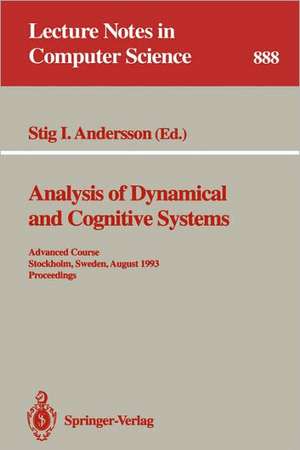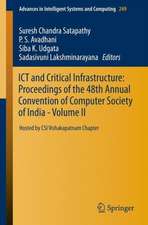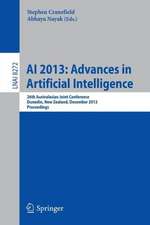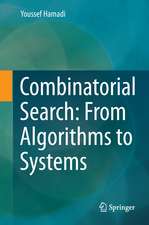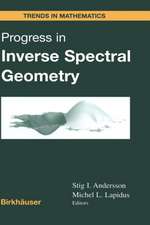Analysis of Dynamical and Cognitive Systems: Advanced Course, Stockholm, Sweden, August 9 - 14, 1993. Proceedings: Lecture Notes in Computer Science, cartea 888
Editat de Stig I. Anderssonen Limba Engleză Paperback – 26 ian 1995
The volume contains eight carefully revised full versions of the invited three-to-four hour presentations as well as two abstracts. As a consequence of the interdisciplinary topic, several aspects of dynamical and cognitive systems are addressed: there are three papers on computability and undecidability, five tutorials on diverse aspects of universal cellular neural networks, and two presentations on dynamical systems and complexity.
Din seria Lecture Notes in Computer Science
- 20%
 Preț: 1061.55 lei
Preț: 1061.55 lei - 20%
 Preț: 307.71 lei
Preț: 307.71 lei - 20%
 Preț: 438.69 lei
Preț: 438.69 lei - 20%
 Preț: 645.28 lei
Preț: 645.28 lei -
 Preț: 410.88 lei
Preț: 410.88 lei - 15%
 Preț: 580.46 lei
Preț: 580.46 lei - 17%
 Preț: 427.22 lei
Preț: 427.22 lei - 20%
 Preț: 596.46 lei
Preț: 596.46 lei -
 Preț: 381.21 lei
Preț: 381.21 lei - 20%
 Preț: 353.50 lei
Preț: 353.50 lei - 20%
 Preț: 1414.79 lei
Preț: 1414.79 lei - 20%
 Preț: 309.90 lei
Preț: 309.90 lei - 20%
 Preț: 583.40 lei
Preț: 583.40 lei - 20%
 Preț: 1075.26 lei
Preț: 1075.26 lei - 20%
 Preț: 310.26 lei
Preț: 310.26 lei - 20%
 Preț: 655.02 lei
Preț: 655.02 lei - 20%
 Preț: 580.93 lei
Preț: 580.93 lei - 20%
 Preț: 340.32 lei
Preț: 340.32 lei - 15%
 Preț: 438.59 lei
Preț: 438.59 lei - 20%
 Preț: 591.51 lei
Preț: 591.51 lei - 20%
 Preț: 649.49 lei
Preț: 649.49 lei - 20%
 Preț: 337.00 lei
Preț: 337.00 lei -
 Preț: 449.57 lei
Preț: 449.57 lei - 20%
 Preț: 607.39 lei
Preț: 607.39 lei - 20%
 Preț: 1024.44 lei
Preț: 1024.44 lei - 20%
 Preț: 579.30 lei
Preț: 579.30 lei - 20%
 Preț: 763.23 lei
Preț: 763.23 lei - 20%
 Preț: 453.32 lei
Preț: 453.32 lei - 20%
 Preț: 575.48 lei
Preț: 575.48 lei - 20%
 Preț: 585.88 lei
Preț: 585.88 lei - 20%
 Preț: 825.93 lei
Preț: 825.93 lei - 20%
 Preț: 763.23 lei
Preț: 763.23 lei - 17%
 Preț: 360.19 lei
Preț: 360.19 lei - 20%
 Preț: 1183.14 lei
Preț: 1183.14 lei - 20%
 Preț: 340.32 lei
Preț: 340.32 lei - 20%
 Preț: 504.57 lei
Preț: 504.57 lei - 20%
 Preț: 369.12 lei
Preț: 369.12 lei - 20%
 Preț: 583.40 lei
Preț: 583.40 lei - 20%
 Preț: 343.62 lei
Preț: 343.62 lei - 20%
 Preț: 350.21 lei
Preț: 350.21 lei - 20%
 Preț: 764.89 lei
Preț: 764.89 lei - 20%
 Preț: 583.40 lei
Preț: 583.40 lei -
 Preț: 389.48 lei
Preț: 389.48 lei - 20%
 Preț: 341.95 lei
Preț: 341.95 lei - 20%
 Preț: 238.01 lei
Preț: 238.01 lei - 20%
 Preț: 538.29 lei
Preț: 538.29 lei
Preț: 331.40 lei
Preț vechi: 414.26 lei
-20% Nou
Puncte Express: 497
Preț estimativ în valută:
63.43€ • 65.96$ • 53.08£
63.43€ • 65.96$ • 53.08£
Carte tipărită la comandă
Livrare economică 15-29 martie
Preluare comenzi: 021 569.72.76
Specificații
ISBN-13: 9783540588436
ISBN-10: 3540588434
Pagini: 276
Ilustrații: VIII, 268 p.
Dimensiuni: 155 x 235 x 14 mm
Greutate: 0.39 kg
Ediția:1995
Editura: Springer Berlin, Heidelberg
Colecția Springer
Seria Lecture Notes in Computer Science
Locul publicării:Berlin, Heidelberg, Germany
ISBN-10: 3540588434
Pagini: 276
Ilustrații: VIII, 268 p.
Dimensiuni: 155 x 235 x 14 mm
Greutate: 0.39 kg
Ediția:1995
Editura: Springer Berlin, Heidelberg
Colecția Springer
Seria Lecture Notes in Computer Science
Locul publicării:Berlin, Heidelberg, Germany
Public țintă
ResearchCuprins
The limits of mathematics course outline and software.- Historical background of Gödel's theorem.- A formal scheme for avoiding undecidable problems. Applications to chaotic behavior characterization and parallel computation.- Cellular neural networks — A tutorial on programmable nonlinear dynamics in space.- Neural coding: A theoretical vista of mechanisms, techniques, and applications.- Hebbian unlearning.- Mapping discounted and undiscounted Markov Decision Problems onto Hopfield neural networks.- “Blob” analysis of biomedical image sequences: A model-based and an inductive approach.- Simplicity criteria for dynamical systems.- Analysis of dynamical systems using predicate transformers: Attraction and composition.
